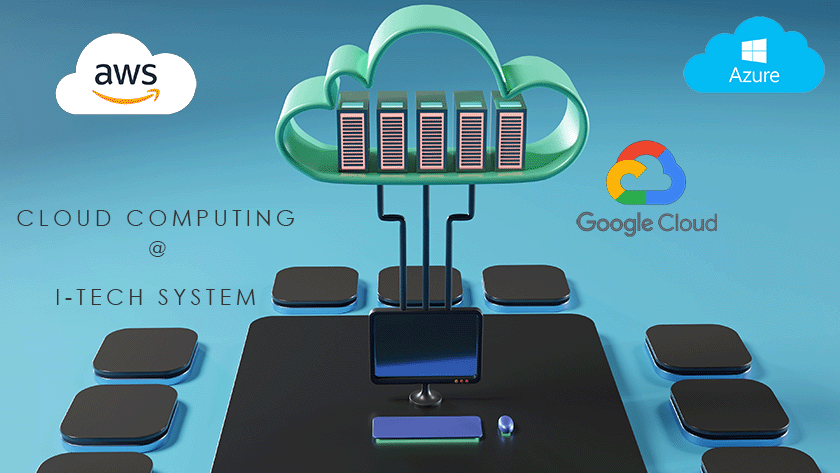Cloud Computing Course
In the dynamic landscape of IT, Cloud Computing has emerged as a transformative force, revolutionizing the way businesses manage and deploy their digital infrastructure. I-Tech System design the Computing course to equip you with the knowledge and skills needed to harness the power of the cloud. Whether you’re an IT professional seeking to enhance your skills or a beginner looking to enter the world of cloud technology, this course is your gateway to a future-ready career.
Cloud Computing Course Overview:
This course provides a holistic understanding of Cloud Computing, covering fundamental concepts, popular platforms, and practical implementation. From cloud architecture and services to hands-on projects, you’ll gain the expertise required to navigate the complexities of the cloud and leverage its potential for innovation.

Introduction to Cloud Computing
- Defining Cloud Computing and its key characteristics
- Historical evolution and the significance of the cloud
- Cloud service models: IaaS, PaaS, SaaS
- Deployment models: Public, Private, Hybrid, and Multi-cloud
Cloud Service Providers
- Overview of major cloud providers (AWS, Azure, Google Cloud)
- Choosing the right provider for specific business needs
- Setting up accounts and navigating cloud consoles
- Understanding pricing models and cost management
Cloud Architecture and Infrastructure
- Design principles for scalable and resilient cloud architecture
- Virtualization and containerization technologies
- Networking in the cloud: VPCs, Subnets, Security Groups
- High Availability and Fault Tolerance
Cloud Storage Solutions
- Types of cloud storage: Object, Block, File
- Amazon S3, Azure Blob Storage, Google Cloud Storage
- Data durability, redundancy, and access controls
- Data migration strategies
Compute Services in the Cloud
- Virtual Machines (EC2, Azure VMs, GCE)
- Serverless computing with AWS Lambda, Azure Functions, Google Cloud Functions
- Container orchestration with Kubernetes
- Autoscaling and load balancing
Cloud Security
- Security best practices in the cloud
- Identity and Access Management (IAM)
- Encryption and data protection
- Compliance and auditing
Cloud Management and Monitoring
- Cloud management tools and platforms
- Monitoring and logging for performance and security
- Automation with Infrastructure as Code (IaC)
- Incident response and troubleshooting in the cloud
Cloud Projects and Case Studies
- Applying cloud skills to real-world projects
- Collaborative projects with peers
- Case studies of successful cloud implementations
- Problem-solving and critical thinking in cloud environments
Course Benefits:
- Hands-on experience with leading cloud platforms
- In-depth knowledge of cloud architecture and services
- Practical skills in designing and implementing cloud solutions
- A portfolio of projects showcasing your cloud expertise
- Guidance from experienced cloud professionals
- Access to a supportive online community of learners
Check our cloud Computing Jobs
Course Duration: The course is typically conducted over 12 weeks, allowing for a comprehensive exploration of cloud concepts and practical applications.
Certification: Upon successful completion of the course and the final project, you will receive a Comprehensive Cloud Computing course completion Certificate by I-Tech System.
Career Opportunities: With cloud computing skills in high demand, this course prepares you for roles such as Cloud Architect, Cloud Engineer, DevOps Engineer, and more. The versatility of cloud knowledge opens doors to various industries and positions in the IT sector.
Enroll Today: Seize the opportunity to become a proficient Cloud Computing professional. Enroll in our Comprehensive Cloud Computing course and embark on a transformative journey in the world of cloud technology.
Prerequisites:
- Basic understanding of IT concepts.
- Familiarity with networking and virtualization is advantageous but not mandatory.
